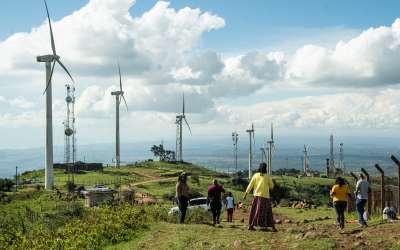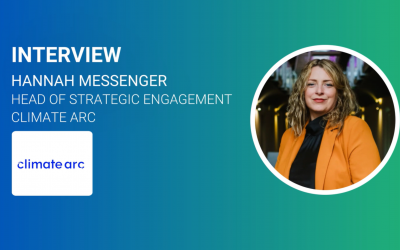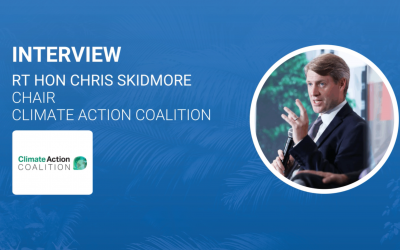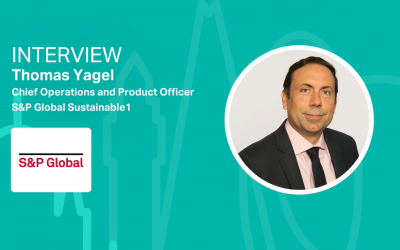COP29 – Tackling Emissions From Hard-to-Abate Sectors
As COP29 continues its second week in Baku, the UNFCCC TEC’s Technology Day on Transformative Industry explored technology and policy options for hard-to-abate industries - which must be addressed to reduce global emissions - as countries develop and implement their NDCs.

Yesterday, climate talks in Baku resumed, with UN Climate Change Executive Secretary Simon Stiell noting the encouraging progress seen, particularly on carbon markets, but remarked, “There’s more work to do of course, and I am certainly not complacent, there are still challenges ahead there. The bottom line is we are a long way from halving global emissions this decade. So progress at COP29 is absolutely essential. And we must help countries pick up the pace over this final week.”
Stiell urged parties to move on to major political decisions as early as possible, “We can’t lose sight of the forest because we’re tussling over individual trees...We will only get the job done if Parties are prepared to step forward in parallel, bringing us closer to common ground.”
Driving climate action through hard-to-abate sectors
Hard-to-abate sectors – such as heavy-duty trucking, shipping, aviation, iron and steel, and chemicals and petrochemicals – are responsible for around 20% of global CO2 emissions, according to an International Renewable Energy Agency (IRENA) report published earlier this year. Therefore, decarbonising these sectors will be important for aligning global emissions with a 1.5°C trajectory.
At COP29, UN Climate Change’s Technology Executive Committee (TEC) and the United Nations Industrial Development Organization (UNIDO) co-organised a Technology Day on Transformative Industry, highlighting policy and technology innovations that can deliver rapid, impactful emission reductions in heavy industries.
Despite the potential of these sectors to drive climate action, currently only a fraction of national climate plans – nationally determined contributions (NDCs) - include emission reduction targets in the industrial sector.
At the event, Robert Habeck, Germany's Vice-Chancellor and Federal Minister for Economic Affairs and Climate Action, said: “The decarbonisation of global industry is within reach, but only if we act decisively and collectively. Germany stands ready to lead, innovate, and collaborate with partners worldwide to bring transformative technologies to scale. By working together – across borders and across sectors – we can ensure that industry not only meets the demands of the future, but leads the way in building a resilient, sustainable, and climate-conscious global economy.”
Syeda Rizwana Hasan, Honourable Advisor for the Ministry of Environment, Forest and Climate Change of Bangladesh, said: “Vulnerable countries with limited decarbonization capacity need to have adequate financial and technical support to develop green industries without compromising inclusive economic growth. For emerging and fast-growing developing countries, there is a need for international cooperation and financial and technological assistance to foster decarbonisation.”
“The need is for easy and simplified access to concessional finance and technological transfer to the states, private sector actors and communities to accelerate their decarbonisation efforts for a just and inclusive transition,” she added.
During the event, examples were showcased of technology developed to decarbonise production processes. The TEC also launched its latest policy brief providing actionable guidance to integrate hard-to-abate industries into national climate targets, in alignment with the Paris Agreement’s 1.5°C goal.
Liftoff plans for hard-to-abate sectors at the Sustainable Innovation Forum
Last week, the Climate Action Innovation Zone hosted the Sustainable Innovation Forum on 13/14 November, bringing together stakeholders from across the global innovation ecosystem.
The panel discussion Liftoff plans for Hard to Abate Sectors, moderated by Chair of the Forum Nik Gowing, featured Vanessa Chan ,Chief Commercialisation Officer of the U.S. Department of Energy; Sir Andrew Steer, President & CEO of Bezos Earth Fund; Chris Stephens, Director (Africa and Asia) at Carbon Trust; Prof. Miranda Barker OBE, CEO of Lancs Chamber of Commerce and Chair of British Chamber of Commerce’s BCC Net Zero Taskforce; and Rana Ghoneim, Chief of the Division of Energy and Climate Action at UNIDO.
Sir Andrew Steer spoke to the role of government in supporting such sectors, “Bankers and financiers require some confidence that there will be an off-take, the off-takers in turn don't know what they'll need, they don't how much is able to produced or at what cost. So, the financiers want long-term knowledge, the buyers want short-term contracts. That is a temporal mismatch, which needs to be addressed and that's where there is a legitimate role for government. It's a very exciting time in terms of creating markets for interesting innovations and reducing the time that they would take to get to efficiency on their own.”
The discussion can be viewed here: Agenda | Sustainable Innovation Forum | COP29






